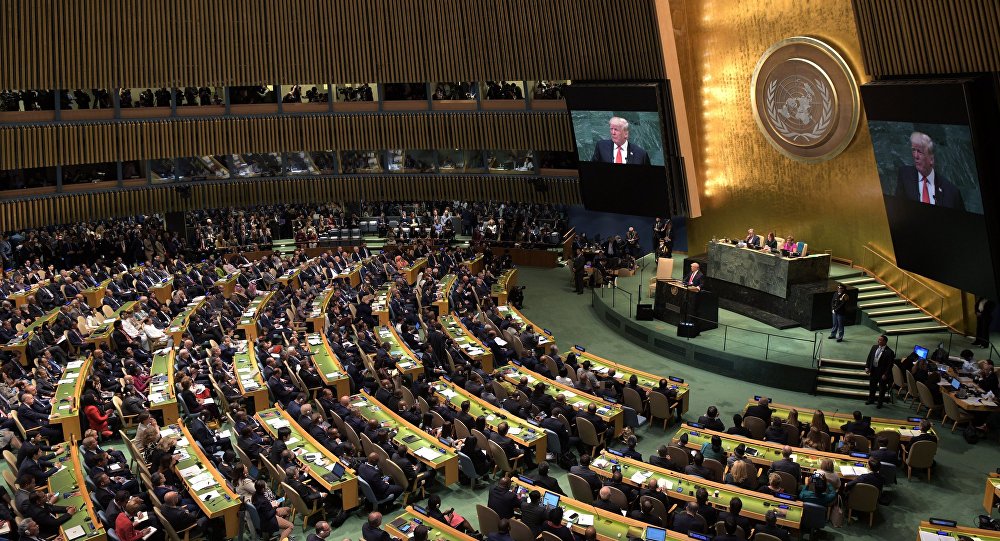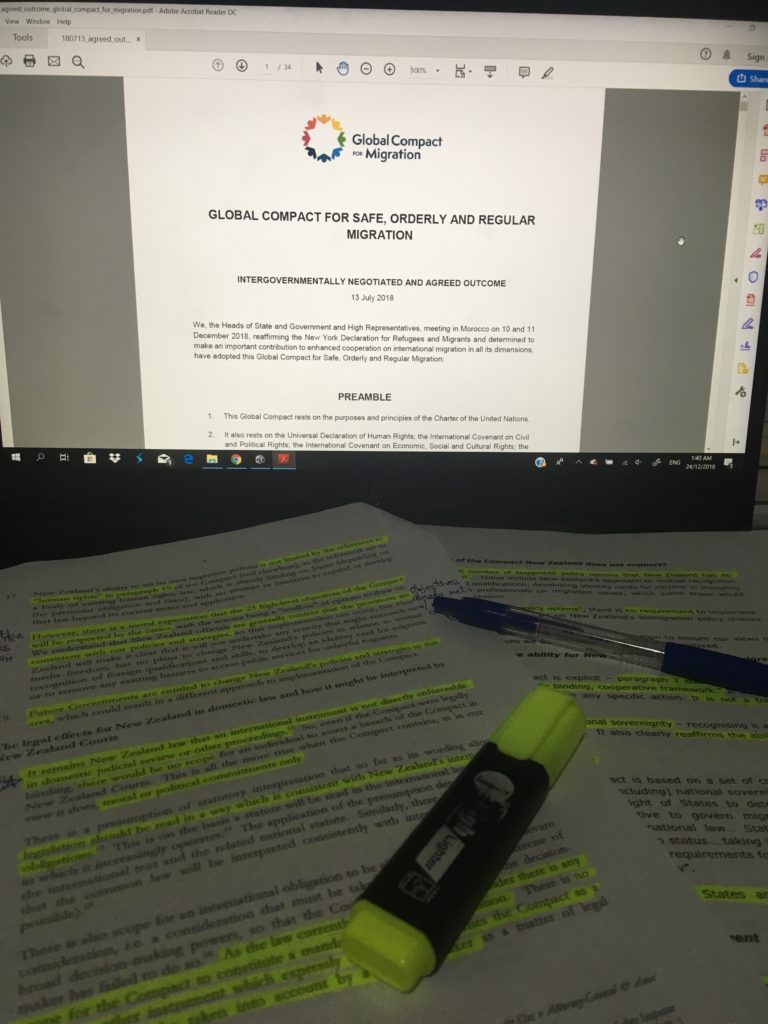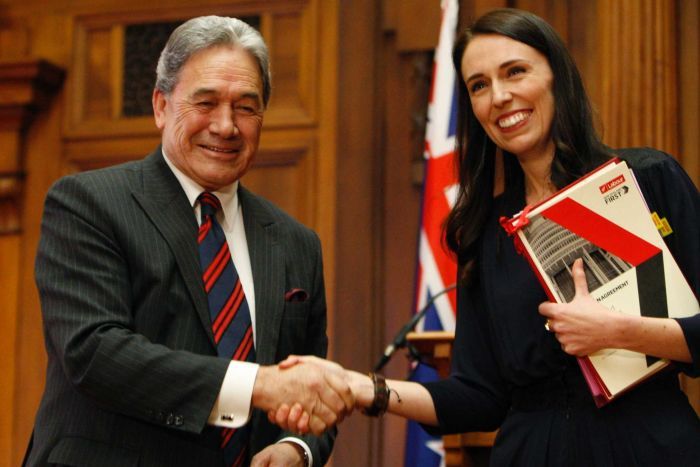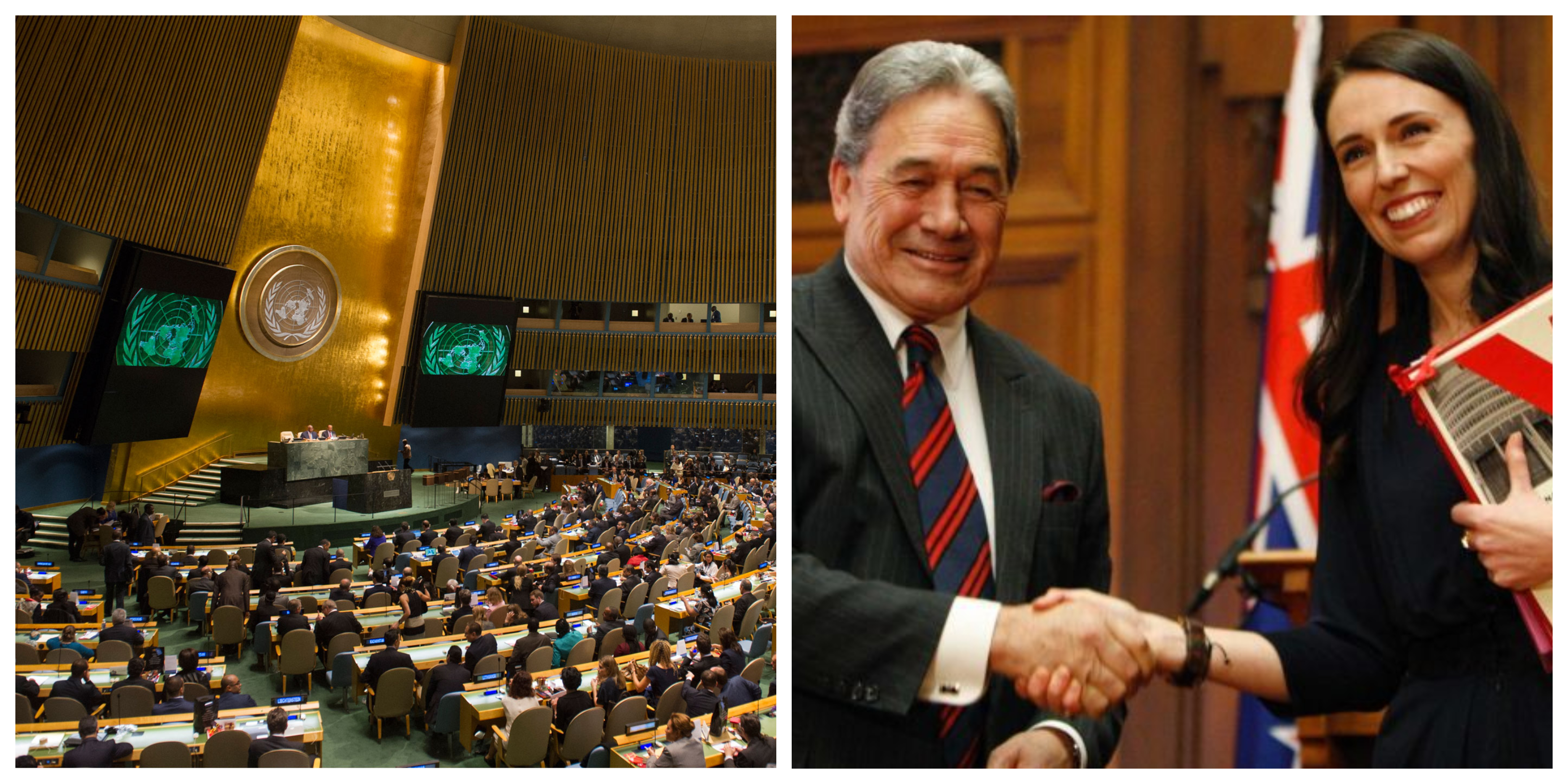It was only fitting that an eventful political year would culminate in vitriol that has swept many people on social media.
The latest storm in a teacup to hit New Zealand’s political scene is not even a domestic issue, but rather of foreign policy. The Coalition Government decided to vote in favour of the United Nations Global Compact for Safe, Orderly and Regular Migration, represented on the international stage by the Foreign Affairs Minister Winston Peters.

Controversy arose when critics of the Government falsely attributed the Compact as a treaty that would compel sovereign states to accept migrants, with even some speculating that by agreeing to the international pact New Zealand will effectively lose control of its borders.
(READ the full text of the UN Global Compact: HERE)
However, the UN Global Compact on Migration is not even a treaty — it is, according to its text, “an intergovernmentally negotiated agreement, prepared under the auspices of the United Nations, that covers all dimensions of international migration in a holistic and comprehensive manner”.
The Compact lists out 23 objectives to attain a humane and sustainable global migration that respects human rights and reduces the risks migrants face when moving from one territory to another. This global agreement does not refer to the sovereignty of countries, but rather ensuring that human dignity is not diminished in the process of migration.
Given that the Compact is not a treaty, it is non-binding in international law. This position was further reinforced by the Crown Law Office and the Ministry for Foreign Affairs and Trade (MFAT), who were both tapped by the Government to provide legal advice over the wording of the Compact.
(READ the official legal advice from the Crown Law Office: HERE)
Paragraph 7 of the Compact’s preamble explicitly states: “This Global Compact presents a non-legally binding, cooperative framework that builds on the commitments agreed upon by Member States in the New York Declaration for Refugees and Migrants.”
The advice from the Crown Law Office also notes that “there is an absence of mandatory language in the Compact, with the language being used consistent with non-legally binding declarations and similar documents and crucially there is an absence of clear and identifiable obligations.” (p. 3, paragraph 11)
In addition to the definitive proof of its non-binding nature, the Compact also reaffirms the sovereignty of different states in its text. Paragraph 7 reads: “[the Compact] fosters international cooperation among all relevant actors on migration, acknowledging that no State can address migration alone, and upholds the sovereignty of States and their obligations under international law.“

The author doing research on the UN Global Compact, the Crown Law Office legal advice and other resources pertaining to the Compact.
Furthermore, the issue of state sovereignty is further reinforced in Paragraph 15 of the Compact which reads: “The Global Compact reaffirms the sovereign right of States to determine their national migration policy and their prerogative to govern migration within their jurisdiction, in conformity with international law”.
This was also mentioned in the legal advice by the Crown Law Office, which noted that supporting the Compact “does not constrain or limit the actions of future governments over immigration or national migration policies”. (page 3, paragraph 16)
The advice also notes that “as it remains in New Zealand law an international instrument is not directly enforceable in domestic judicial review or other proceedings” (page 4, paragraph 20). Many had argued that supporting the Compact will restrict elected Governments from controlling our immigration policy, this analysis should dispel those speculations completely.
With that, the Crown Law Office takes the view that the Compact does not entail New Zealand to do any tasks but rather “moral and political commitments only” (page 4, paragraph 20).
There is nothing that New Zealand must do by our support of the Compact, but we are expected to uphold the objectives set out in the Compact the same way that the UN Declaration of Human Rights expects us to respect fundamental human rights of our people.
Commonsense should have been enough to know that the Compact does not surrender our sovereignty, 152 countries voted in favour for this UN resolution which include Russia, France, China and the United Kingdom.
Are those alarmists really going to suggest that those four military superpowers will voluntarily surrender their country’s sovereignty just like that?
A common refrain heard from the side of the fear-mongering critics is that our traditional allies such as Australia and the United States did not sign it, which they take as a warning sign for us not to sign also.
However, it is easy to understand why the USA would not support the Compact given the populist, anti-migrant rhetoric of Donald Trump which saw inhuman crackdown of immigrants in June this year.
Australia’s domestic politics can also be attributed to their abstention from the Compact, with Prime Minister Scott Morrison attempting to win voters by taking a hardline stance on immigration.
Despite the conclusive findings, many remain disgruntled over the Government’s decision to support the Compact. Sentiments on social media equated their act to “treason”, insisting that their election campaign promise to significantly reduce immigration has been reneged.
On the contrary, the Compact actually enables New Zealand to reduce the levels of immigration it receives. According to the Compact’s digest, it also: “aims to mitigate the adverse drivers and structural factors that hinder people from building and maintaining sustainable livelihoods in their countries of origin”.

This is reflected in the Compact’s Objective #2 aims “to minimize the adverse drivers and structural factors that compel people to leave their country of origin”. By understanding the push factors migrants experience, we can prevent their need to leave their respective homelands and thus reduce the level of migration that we take in and thus in line with the Coalition Government’s priorities.
Objective #4 is also of interest, it aims “to ensure that all migrants have proof of legal identity and adequate documentation”. This is in sync with the desire of New Zealand First supporters (one of the Coalition Government parties and led by the Foreign Minister) to ensure a robust and secure border.
Despite the rational and justifiable nature of the Compact, it is among the most widely criticized international agreements made by a New Zealand Government – rivaled only by the TPPA. The main opposition party, National, claims that the Compact “treats legal and illegal migrants the same way”.
This is true, the Compact itself does not distinguish between legal and illegal migrants because that distinction is a matter for sovereign nations to decide according to their own immigration policies. The Compact does instead repeatedly differentiate “regular” and “irregular” migration, as can be seen in Paragraph 27, page 18 and in Paragraph 15, page 4.
It is very clear that the Compact is not an international treaty, and therefore cannot be used against our country in an international court or tribunal. Rather, it is a framework that different member-states of the United Nations have collectively drafted and agreed upon to ensure safe, orderly and humane migration that protects human life.
The Compact was established on good intentions. It is shameful that a handful of opportunistic entities have chosen to go on a populist rampage to smear the agreement as something it is not.


Another aspect of Winston Peters, the leader of the NZFirst party, signing the Compact on Migration is that he is signing in his capacity as foreign minister in the coalition government,
The decision to sign would have been taken by cabinet which makes its decisions by consensus rather than by vote.
The signing is therefore not the NZFirst party’s doing, but the Governments decision.
Support parties are often blamed for abandoning their own promised policy when in the fold of cabinet,, but this is not the case here as signing the compact will not increase the number of migrants that NZ takes in.
If it is so toothless, and if so limited in the expectation of adherence, then why are we bothering.
Reference to the UDHR is misleading in that it was enthusiastically embraced in 1948 by a world shocked and grieving. It has never been implemented or enforced, and is a base document in giving nations a reason to condemn other nations on their standard or conduct regardless of citizen lack of resistance. UDHR is the basis of current globalization attempts, which are wrong in that any elected government has a fiduciary duty of care to it citizens.
This UN immigration pact is in breach of the democratically elected government duty of care. Refer my FB page outlining the proposed Supreme Court challenge to NZ signing the pact, and if won then all democratic governments are liable, with the consequence that signing this immigration pact is in breach of the government duty of care to citizens.
> “If it is so toothless, and if so limited in the expectation of adherence, then why are we bothering.
Because it is a well-meaning document that wants to find ways to protect human life and dignity. When did NZ become a heartless country as to not care about the life of others?
> “It has never been implemented or enforced, and is a base document in giving nations a reason to condemn other nations on their standard or conduct regardless of citizen lack of resistance.”
Exactly. Just like the UDHR, the Compact is a FRAMEWORK and a BASIS of our affairs, it is not binding and cannot compel us to implement anything the NZ Government does not want. And you contradicted yourself, if it has never been implemented/enforced how on Earth is it spearheading a globalization attempt?
> “This UN immigration pact is in breach of the democratically elected government duty of care. Refer my FB page outlining the proposed Supreme Court challenge to NZ signing the pact”
That’s a far-cry seeing it succeed in any form, shape or way in the judiciary given that the Crown Law Office had definitively ruled that there is nothing wrong with the Compact. Also, how do you “sign” a Pact? It is not a Treaty, it does not need to be signed.
Before embarking o0n trivial dismissal of my comment, suggest you read the reason I hold such a view. You exhibit serious un-reasoned and compliant superficiality in your comments.
I have presented counter-arguments refuting your points. All I see from your objections are fear-mongering conspiracy theories – speculative at best – which are baseless and unfounded.
You would not know. You have not done any work of research and scientific consideration of an alternative point of view that you clearly do not want to even consider. In the New Year, I will be working to have those ‘speculative fear mongering conspiracy theories’ tested in the NZ Supreme Court. Abusive name calling does not help and does not alter the reasoning. I decline to bother with you further.
I have literally written an in-depth article explaining why the UN Compact has been irrationally criticized by many, including yourself. I have referred to exact paragraphs of both the Compact document and the Crown Law Office legal advice. You can go ahead and see your own money get wasted at the Supreme Court, I highly doubt you will do anything different.
As for the “alternative point-of-view” you are referring to, I already refuted the counter-arguments you made in the first comment. You did not even bother to respond to that counter-argument and instead started accusing me of trivial nonsense. But anyway, thanks for the repeated visits to my site – I will use the revenue to have a coffee and write more articles countering fake news from people like you.
All very sad … you countered nothing you reflected on nothing, but sadly, you can make money out of it.
Graham Little, I have been and had look at your facebook page that you have invited Louie to look at. I have found that on your Facebook site you have virtually no information about yourself at all. Personally I am suspicious of people with no information about themselves, it seem to me that perhaps they are not proud of their personal circumstances, attitudes and accomplishments. Perhaps those persons do not want to be judged by their arguments.
You cause Louie of ‘name calling”, well in this commentary I cannot see evidence of that.
I do take your offering that a passport should be a document to be proud of, and your contention that it should be the basis of citizenship and a governments duty of care to said citizens. I agree with that.
I do not see that signing the UN Compact on Migration would change your contention in any way. The Compact is an aspirational pact with no legal status in this country and according to the legal opinion obtained by the coalition government no legal challenge could be mounted if the aspirations therein are not met.
I thank you for your engagement in the discussion. At least your comments are not without reason as are many unthinking and uneducated emotive comments on the facebook-o-sphere.
You ‘agree’ with my linking citizenship to passport to citizen identify. Then you decline to note my key point, namely are these links legally rights of a citizen. If so, then any devaluing of the passport has the effect of eroding citizen rights. The immigration pact devalues the passport … by extending rights of access to all. That this deserves to be tested in the Supreme Court. If found to be so in NZ, then it is so in every democratic country. If that so, globalism is finished, and the fundamental unit of human global civilization is the independent nation. You offer the most superficial assessment and expect it to be taken seriously. Even then, you are unable to do it without personal attack and insult. Sad, making this discussion no more reasoned that found on Facebook. Opinions do not matter, what matters is the argument which results in the opinions… suggest you THINK very carefully and work that out. You ‘agree’ the argument, but too stuck in your opinion to step forward and accept the conclusion of the argument. The immigration is an extremely uncertain step, possibly illegal at least in democracies, possibly the government acted in breach of fiduciary duty of care to citizens. It follows from the argument that you ‘agree’ with … have the courage and follow your reasoning, and give up on your predilections.
Your accusations of “eroding citizen rights” and the “Devaluing” of the passport are moot given that Objective #4 of the Compact literally wants to strengthen documentation and identification of migrants. Objective #11 also calls for improved border management, which effectively ensures that not everyone can just enter a country willy-nilly.
And as I said, go ahead and waste the Supreme Court’s time. That is your choice how you want to waste your resources. I’m just saying it is not relevant – nor noteworthy – at this stage.
Once again I thank you for your continued patronage of my website. Please share to all your friends.
If it so innocuous, so innocent, so toothless, and if it does not either legally or intent alter in any way existing border controls, why did NZ sign it? There is also principle you so carefully ignore, that is if immigration is a ‘human right’, assigned to everyone, where does that leave the passport, and why is the passport not then devalued? Perhaps it is a waste of time, but unlike you, I judge it important we find out if there is legal validity to the argument. Unlike you, I believe we need ensure a solid legal foundation to the processes of our society especially involving our citizen rights and the limits to government to erode or devalue those rights. Pity you so cavalier with what are significant intellectual issues, in this case of global jurisprudence. … especially if people are reading your blogs.
> “If it so innocuous, so innocent, so toothless, and if it does not either legally or intent alter in any way existing border controls, why did NZ sign it?”
Graham, I literally answered this question of yours in your first ever comment. I am sorry your reading comprehension is poor (I’ll point it down to old-age senility) but if you’re so desperate to know then re-read my first response to your comments.
> “if immigration is a ‘human right’, assigned to everyone, where does that leave the passport, and why is the passport not then devalued”
People have the human right to move from their origin location to another, but it is ultimately the final decision of the nation-state to decide who enters their borders or not.
People have a human right to move, but that does not supersede the sovereign rights of countries.
The passport and legitimacy are LITERALLY reinforced in the Compact, but obviously you have not read it as is obvious in the arguments you make. (Unless it comes down to your cognitive problems again?)
> “Pity you so cavalier with what are significant intellectual issues, in this case of global jurisprudence. … especially if people are reading your blogs.”
I regard these issues with great importance, which is why I bother to RESEARCH, READ and ANALYZE and not just rely on propaganda of other parties. I suggest you do the same, it is never to late in life to be better at academia.
Thank you again for visiting the website.
You are of course welcome to your interpretation, not everyone agrees with you. I am one such. And no, the question of ‘why’ remains vague and unanswered, leaving lingering ‘behind the scenes’ suspicions. Detailed rejection of your points is readily available, but this not the forum. I suggest you drop the attitude you are totally correct and everyone else stupid and limited as regards your superiority. You agree the issue is important, then accept there are alternative points of view to those you offer, and these conflicting ideas need legally assessed. You exhibit no evidence of an appropriate a balanced perspective, that truth is not found so simply in a single set of ideas, especially when those ideas subject to redefinition that defines more carefully crucial issues in global jurisprudence. I judge it important to find out… . You seem to be not interested, that you think it all done and dusted … I don’t. I repeat, It needs formally explored … it is too important not to. I do not judge myself sufficiently skilled to formally explore it, and judge neither are you.
My viewpoint is not just my opinion, it is an informed stance reinforced by the findings of the Crown Law Office and the Ministry of Foreign Affairs and Trade.
If you so wish to waste your time by going to the Supreme Court, be my guest. I have no qualms about it because I truly believe it will result to absolutely nothing. But hey, it is your right as a citizen to do so.
I have no problem with your questions being asked in my website, it is only improving my website visibility and improving my site traffic.
good point Louie, dont u get tired of all this trumpist refugee-hating fascism, a pack of lies from heartless vicious disrupters trying to sow rascist discord and anger among the people. they are often paid and many go under false names because theyre skulking cowards and get joy from attacking those who are powerless and weak, the opposite of christs teachings, ie love and acceptance and embracing those in need, and not setting up extermination camps of which we have seen no end of in the last few decades. We will fight tooth and nail to stop them and their evil ideology that masquerades as concern for nation and culture and family-values straight out of nazi propaganda, in a world facing the biggest refugee problem ever. They dont understand what compassion is. They run-with-the-wolves to take down the defenceless and weak and then gloat!
Each to their own… I prefer informed comment to offering abuse. Suggest you read the original analysis where you will find the careful extension of the idea of sovereignty, which makes the Law Office position redundant… I believe in reason, if that makes me as you describe, then so be it. My work is for those who actually care about the future of our grand children. I’m gone this time, no point in trying to reason with those disinterested.